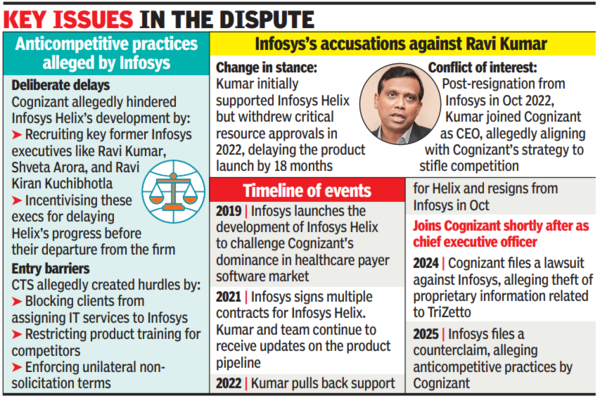BENGALURU: Infosys filed a counterclaim against Cognizant in a US court, alleging that its rival Cognizant and its CEO, Ravi Kumar, engaged in anticompetitive practices to stifle competition and maintain dominance in the healthcare payer software market. Infosys demanded a jury trial and sought triple compensation for damages incurred, along with appropriate legal fees and expenses.
This development came six months after Cognizant filed a lawsuit against Infosys, alleging that the latter stole proprietary information related to its health tech subsidiary, TriZetto. Cognizant acquired the healthcare tech firm TriZetto for $2.7 billion in 2014.
In 2019, Infosys decided to challenge Cognizant’s dominance in the healthcare payer software market. It developed a payer software platform called Infosys Helix, which caters to clients’ demand for cloud-based products. Infosys alleged that Cognizant implemented measures to hinder Infosys’s efforts in creating a rival software solution. Cognizant created entry barriers while attracting key executive sponsors away from the project. These executives, Infosys said, were encouraged to stifle product advancement during their final months with the firm.

The lawsuit alleged that the primary executive sponsor of Infosys Helix was Kumar, who was its former president, and he championed Helix during his tenure at the firm. “But Kumar’s optimism and excitement for the Infosys Helix product suddenly changed in 2022. He began to pull back support for Infosys Helix, declining requests for needed resources, which delayed the completion of Infosys Helix by at least 18 months. In October 2022, Kumar resigned from Infosys, and shortly thereafter, was announced as CTS’s new CEO. Cognizant’s anticompetitive scheme to stall Infosys Helix’s launch included the targeted recruitment of key senior executives responsible for Infosys Helix, including Kumar, Shveta Arora, and Ravi Kiran Kuchibhotla, and incentivising them to delay and obstruct the development and marketing of Infosys Helix in the months leading up to their departures. This conduct was designed to disarm Infosys’s new competitive threat to Cognizant’s dominance over the healthcare payer software market,” the document accessed by TOI showed.
The counterclaim showed that Kumar, Arora, and Kuchibhotla continued to receive confidential updates about the Infosys Helix business plan and product pipeline through 2021. In the same year, Infosys signed multiple contracts for Infosys Helix, creating substantial value for the company. The trio knew that one of Infosys’s strategies to “displace” and aggressively compete against Cognizant was to leverage Infosys’s software platforms, including Infosys Helix, because there was “CTS (Cognizant) fatigue in key large accounts.”
Despite being presented with these lost opportunities and related challenges, Kumar continued to push back on requests for resources to support the development of Infosys Helix and instead proposed that Infosys Helix “slow down,” suggesting Infosys should not “invest so much engineering dollar on Infosys Helix,” the document showed. An email sent to Infosys on the matter did not elicit a response till the time of going to the press.
The anti-competitive restrictions included implementing most favoured vendor or first right of refusal clauses in Cognizant’s payer agreements. These clauses effectively allowed Cognizant to block its software clients from assigning IT services work to competitors such as Infosys. Restrictions on product training reduced competitors’ capacity to train staff for service delivery. Additionally, bans on developing supplementary products that could integrate with Cognizant’s software, along with unilateral non-solicitation terms, protected Cognizant’s employees from poaching while allowing Cognizant to weaken its rivals’ ability to compete.
When Toi reached out the Cognizant, the company said, “Cognizant is committed to upholding the highest standards of integrity in all business operations and will take decisive action to address any allegations that compromise competitive standing. Cognizant encourages competition, but competitors cannot use Cognizant’s IP to unfairly compete, as Infosys has done. Cognizant’s software products are widely used in the marketplace for being best-in-class and most preferred among customers.”

